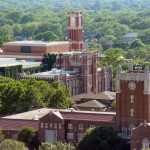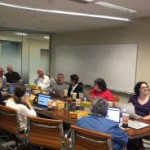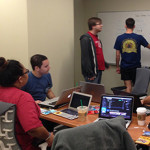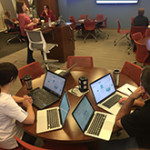Friday, May 12, 2017
8:30am – 3:30pm
Helmerich Collaborative Learning Center
Bizzell Library, Lower Level 1
University of Oklahoma (map)
In partnership with Oklahoma State University, this year’s THATCamp OK will be held at the University of Oklahoma in Norman. Along with a keynote talk by Dr. Nicholas Bauch to start the day off, the day’s activities will include a round of Lightning Talks, followed by a series of sessions that we choose together to help us share skills and ideas to support our research and teaching. Register here.
What is a THATCamp?
THATCamp stands for “The Humanities and Technology Camp.” It is an unconference where humanists and technologists of all skill levels learn and build together in sessions proposed on the spot. An unconference is more informal and more participatory. Here are the key characteristics of a THATCamp:
- It’s collaborative: there are no spectators at a THATCamp. Everyone participates, including in the task of setting an agenda or program.
- It’s informal: there are no lengthy proposals, papers, presentations, or product demos. The emphasis is on productive, collegial work or free-form discussion.
- It’s spontaneous and timely, with the agenda / schedule / program being mostly created by all the participants during the first session.
- It’s productive: participants are encouraged to use session time to create, build, write, hack, and solve problems.
- It’s small, having anywhere from 25 to 40 participants.
- It’s non-hierarchical and non-disciplinary and inter-professional: THATCamps welcome graduate students, scholars, librarians, archivists, museum professionals, developers and programmers, K-12 teachers, administrators, managers, and funders as well as people from the non-profit sector, people from the for-profit sector, and interested amateurs. The topic “the humanities and technology” contains multitudes.
- It’s open and online: participants make sure to share their notes, documents, pictures, and other materials from THATCamp discussions before and after the event on the web and via social media.
- It’s fun, intellectually engaging, and a little exhausting.
- It’s free to registered participants.
What is an “unconference”?
The shortest answer is this: an unconference is a highly informal conference. Two differences are particularly notable. First, at an unconference, the program isn’t set beforehand: it’s created on the first day with the help of all the participants rather than beforehand by a program committee. Second, at an unconference, there are no presentations — all participants in an unconference are expected to talk and work with fellow participants in every session.
Who should attend?
Anyone with energy and an interest in the humanities and/or technology.
What are “the humanities”?
Good question. Turns out there’s a legal definition! As the National Endowment for the Humanities puts it:
According to the 1965 National Foundation on the Arts and the Humanities Act, “The term ‘humanities’ includes, but is not limited to, the study of the following: language, both modern and classical; linguistics; literature; history; jurisprudence; philosophy; archaeology; comparative religion; ethics; the history, criticism and theory of the arts; those aspects of social sciences which have humanistic content and employ humanistic methods; and the study and application of the humanities to the human environment with particular attention to reflecting our diverse heritage, traditions, and history and to the relevance of the humanities to the current conditions of national life.”
What is “technology”?
We suggest you read this article by Professor Leo Marx, American cultural historian at the Massachusetts Institute of Technology: “Technology: The Emergence of a Hazardous Concept.” (Side note: those who love technology should be those who are most aware of its hazards.)
What should I propose?
Sessions at THATCamp usually range from general discussions (Talk sessions) to project-based hackathons or writeathons (Make sessions) to technology skills workshops (Teach sessions) to miscellaneous experiments (Play sessions). There should be no full-blown papers; we’re not here to read or be read to. See the list of sample sessions at thatcamp.org/proposals/ for ideas, or come up with a creative idea of your own for a session genre or topic. Ideally, you should come to THATCamp with something in mind, and on the first day find a time, a place, and people to share it with.
Is a THATCamp only for scholars / grad students / librarians / archivists / programmers / instructional technologists? Can scholars / grad students / librarians / archivists / programmers / instructional technologists apply?
No to the first, yes to the second. THATCamp aims at the broadest diversity of backgrounds and skills possible.







